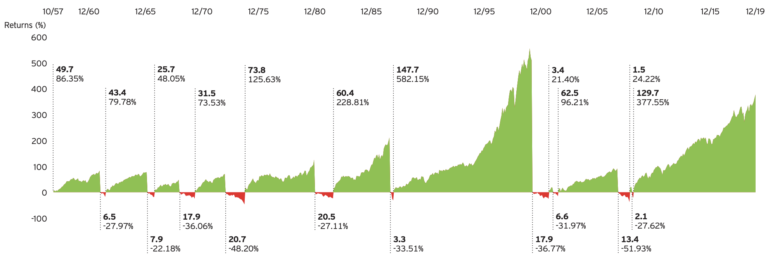You’ve certainly heard the same headline over and over again; somebody somewhere is always talking about a looming market crash of some significance.
What is a Market Crash?
Market crashes, or corrections are generally short-lived, and defined as a drop between 10-20%; whereas, a bear market occurs after a drop of +20% over at least a two-month time frame.
Corrections and bear markets are a normal part of the market cycle, and it’s important to stick to your investment plan and not let panic sway your decisions. A market crash should be viewed as a potential opportunity to buy more assets at a lower price—and reap the advantages when the stock market recovers.
Stick To A Plan, Stay Invested, Try To Avoid Emotional Bias.
Having a plan and sticking with that plan is essential. It can be easy to get sucked in by scary media headlines and hot stocks that are “going to the moon”, but the reality is that most of this is just noise. It is extremely important as an investor to remain cool, calm and collected and make your investment decisions based on your long-term goals and objectives. Rash decisions based on emotions can be devastating to your overarching retirement goals.
Market Crashes are Normal, Don’t Let It Derail You.
Market fluctuations are a normal part of investing. The key is to remember that over time, the uptrends tend to outweigh the downtrends. Thinking long-term can keep things in perspective and prevent you from panicking during the brief downtrends.
The chart below from Invesco traces the history of bull and bear markets and the performance of the S&P 500 during those periods. In general, the downturns tend to be shorter and less impactful than the long-term upward trend.
Planning for the unknown.
If you’re already in retirement and withdrawing from your portfolio then this is an opportunity to tap into the cash reserves you and your advisor have planned for. One of the easiest ways to plan for unknown risks it to implement the three-bucket asset allocation strategy. We use this strategy extensively with our clients and have highlighted how the strategy works in the video below:
https://vimeo.com/452286719%20
If there is one thing to take away, when you sell out of fear, your emotional mistake becomes a permanent loss, and that permanent loss can have a direct impact on your retirement. Instead, when prices go down, that’s your cue to buy more! Always remember to stay disciplined and stick with your long-term plan.
Talk to your financial advisor to ensure your investment strategy is structured to ride through volatile and uncertain investment periods. Especially during times of volatility, it’s best to consult a professional before making changes in terms of asset allocation, investment diversity, or risk tolerance.
If you or someone you know are in need of financial advice, we are always happy to chat. We don’t charge for the first consultation, and there is no obligation to sign-up. Contact us to book a free financial consultation with one of our licensed financial advisors
Read The Full Commentary
If you do not have access to our monthly email, you can request it here:
Your privacy is fully protected. By filling out this form to request this month’s commentary, you give explicit permission for LT Wealth Management Partners to email you to deliver our e-newsletter. It is important to note that your consent acknowledges agreeing to receive our newsletter knowing that your name and email may be stored on external servers outside of Canada.



